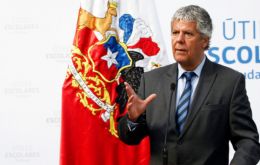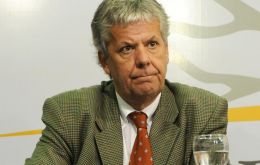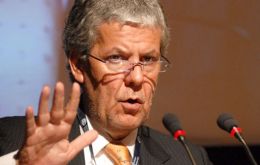MercoPress. South Atlantic News Agency
Tag: Nicolas Eyzaguirre
-
Friday, September 1st 2017 - 09:35 UTC
Bachelet replaces top economic officials: dispute over Chilean mining policy

Chilean President Michelle Bachelet’s top economic officials resigned on Thursday after the cancellation of a major mining project, weakening her center-left coalition before November elections. Finance Minister Rodrigo Valdes said in a news conference some members of Bachelet’s government had not shared his sense of urgency to spur growth and attract investment to the world’s top copper producer.
-
Tuesday, June 2nd 2015 - 05:44 UTC
Teachers take to the streets of Chile to protest education bill in Congress

Several thousand teachers poured into the streets of Santiago and other cities of Chile to express their rejection of an education bill currently being debated in Congress. The Monday march marked the first day of a strike called by the teachers union, which demands changes in key aspects of a bill that includes some of the reforms to the education system being promoted by the Michelle Bachelet government.
-
Wednesday, January 28th 2015 - 07:47 UTC
Relief for Bachelet: Chilean Congress passes ambitious education reform

Chile's President Michelle Bachelet said on Tuesday her government was preparing the second phase of an ambitious education reform, hours after Congress approved the first set of changes.
-
Tuesday, January 28th 2014 - 05:56 UTC
Three crucial ministries in Chilean president elect Bachelet cabinet

Chile’s President-elect Michelle Bachelet ended weeks of speculation about the composition of her Cabinet as she prepares to re-take the presidency on March 11 following her overwhelming win with her New Majority coalition in December 2013. Three ministries will be crucial if Bachelet is to keep her education reform program: Education, Finance and Interior.
-
Saturday, October 20th 2012 - 05:44 UTC
Argentina and Colombia dispute place as second largest South American economy

Argentine Economy minister Hernan Lorenzino struck back at Colombia’s claim that it has overtaken his country to become South America’s second largest economy behind Brazil.
-
Friday, July 27th 2012 - 02:52 UTC
IMF Western Hemisphere director Eyzaguirre resigns; takes CEO job in Chilean television channel

IMF western hemisphere director, Chilean national Nicolás Eyzaguirre, resigned to his post Thursday in order to become the CEO of Chilean Canal 13 network. The International Monetary Fund confirmed the news and added that the official will leave his responsibilities immediately.
-
Thursday, April 26th 2012 - 06:18 UTC
IMF tells Latam good days are not forever and should rebuild ‘defence walls’

The IMF warned Latin America on Wednesday that favourable economic conditions are not for ever and called on the region’s countries to “rebuild defences” ahead of an uncertain economic future.
-
Saturday, April 21st 2012 - 03:56 UTC
IMF says YPF dispute is a “bilateral affair” and decision of “a sovereign nation”

Argentina managed a first point in the diplomatic dispute with Spain over the nationalization of YPF when the IMF decided to call the conflict a “bilateral affair” and “a decision of a sovereign nation”.
-
Wednesday, January 25th 2012 - 07:54 UTC
IMF forecasts 2012 slower growth in Latam, but above the world average

Latin American growth this year should stay under the 4% estimated previously at 3.6% since the region is susceptible to the slowing down of the world’s economy and increasing risks of the financial crisis on the Euro zone, according to the IMF World Economic Outlook released Tuesday.
-
Wednesday, January 4th 2012 - 18:15 UTC
Top IMF economist warns of credit squeeze for Latam if Euro crisis worsens

Latin American economies face a recession and a credit squeeze if Europe's debt crisis worsens, director of the IMF Western Hemisphere Department Nicolas Eyzaguirre said on Wednesday.
